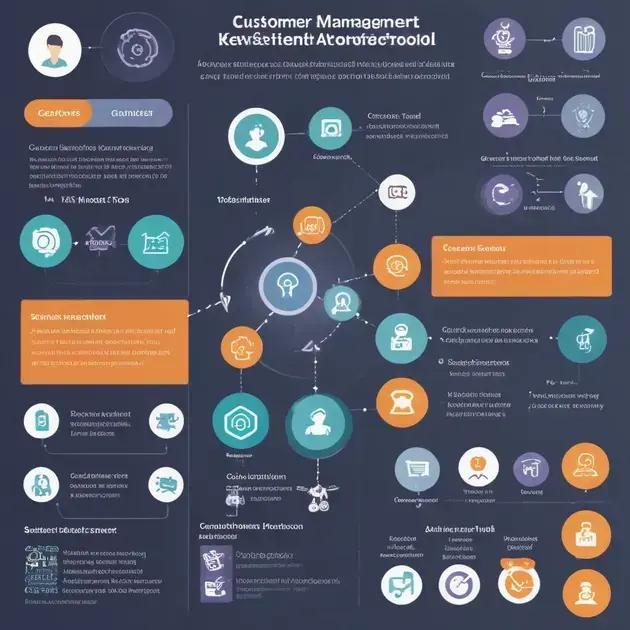A customer management system software is crucial for businesses seeking to enhance customer relationships, automate tasks, and analyze data. By centralizing customer information and providing insightful analytics, a CMS improves efficiency and drives growth through better communication and personalized engagement.
Customer management system software is more than just a tool; it’s a game changer for businesses aiming to improve customer relationships and operations. As companies continually strive to cater to the ever-evolving needs of their clients, integrating a robust customer management system becomes crucial. In this article, we’ll delve into understanding customer management systems, key features to look for, and how they can significantly benefit your business.
Understanding Customer Management Systems
Understanding Customer Management Systems is essential for businesses looking to enhance their customer interactions and streamline operations. A customer management system (CMS) helps to manage customer relationships efficiently, providing businesses with the tools needed to optimize communication and track customer data.
What is a Customer Management System?
A customer management system is a software platform that allows businesses to handle customer data, interactions, and processes. It serves as a centralized database where all customer information can be stored and easily accessed by different departments. This tool is critical for maintaining effective communication between the business and its clients.
Key Components of a CMS
Typical features of a customer management system include contact management, sales tracking, customer support, marketing automation, and reporting capabilities. These components enable businesses to develop more personalized relationships with their customers, improving satisfaction and loyalty.
Importance of a Customer Management System
In today’s competitive market, having a robust customer management system helps businesses understand their customers better. This understanding leads to improved customer experiences and fosters long-term relationships. Additionally, a CMS allows businesses to analyze customer behavior, driving strategic decisions that can enhance marketing campaigns and overall business performance.
Implementing a Customer Management System
When considering a CMS, businesses should assess their unique needs and goals. Choosing the right system involves evaluating various options and selecting a solution that aligns with company operations and budget. Successful implementation also requires proper training for staff to maximize the benefits of the software.
Key Features of Top Customer Management Software

Key Features of Top Customer Management Software are vital for businesses seeking to improve their customer relationships and streamline their operations. Understanding these features can help organizations choose the right solution tailored to their needs.
Contact Management
One of the primary features is contact management. This allows businesses to store and manage customer information, such as names, email addresses, phone numbers, and interaction histories. Having all this information in one place enables better communication and personalized outreach.
Sales Automation
Sales automation tools help to automate repetitive tasks such as sending follow-up emails, setting reminders for calls, and tracking deals. This feature enhances productivity by allowing sales teams to focus on closing deals rather than manual tasks.
Customer Support Tools
Top customer management software often includes customer support functionalities, such as ticketing systems, live chat, and knowledge bases. These tools help businesses address customer issues quickly and efficiently, improving overall satisfaction.
Reporting and Analytics
The ability to analyze customer data through reporting and analytics is essential. Users can generate reports on sales performance, customer interactions, and overall business health. These insights help management make informed decisions regarding marketing strategies and operations.
Integration Capabilities
A good customer management system should also offer integration capabilities with other software applications, such as email marketing tools, accounting software, or e-commerce platforms. This ensures a seamless flow of information across different systems and improves operational efficiency.
Advantages of Using Customer Management System Software
Advantages of Using Customer Management System Software are numerous and can significantly enhance a business’s efficiency and customer relations. By investing in a quality CMS, companies can maximize their operational potential.
Improved Customer Relationships
A customer management system provides a centralized location for all customer interactions and information. This allows businesses to build deeper relationships by accessing past communications, preferences, and purchase history. Personalized interactions lead to improved customer satisfaction and loyalty.
Increased Efficiency
With a CMS, businesses can automate routine tasks such as data entry and follow-ups, freeing up employees to focus on high-value activities. This increased efficiency not only saves time but also reduces the potential for human error.
Enhanced Data Analysis
Customer management software typically includes robust analytics tools that allow businesses to gather insights from customer data. Understanding trends and patterns can help inform marketing strategies, predict customer needs, and ultimately drive sales growth.
Streamlined Communication
A CMS facilitates better communication both within a team and with clients. By having access to the same information, employees can collaborate more effectively and provide consistent messaging to customers, thereby enhancing service quality.
Scalability
As businesses grow, their needs evolve. A robust customer management system can scale with the organization, adding features or integrations as needed. This scalability ensures that the software continues to meet the demands of a growing customer base without requiring a complete overhaul.
How to Choose the Right Customer Management Software

How to Choose the Right Customer Management Software involves several important steps to ensure that you select a system that meets your business needs and improves your customer relations.
Assess Your Business Needs
Start by evaluating the unique needs of your business. Consider what features are most important to you, such as contact management, sales tracking, or customer support tools. Identifying these needs will help narrow down your options.
Consider User Experience
A user-friendly interface is crucial when choosing customer management software. If the software is difficult to navigate, your team may struggle to adopt it fully. Look for options that offer a smooth workflow and straightforward setup.
Evaluate Scalability
As your business grows, your customer management needs may change. Choose software that can scale with your business. This means it should be able to handle increased data volumes and offer additional features as needed.
Check Integration Capabilities
The ability to integrate seamlessly with other tools is essential. Ensure that the software can connect with your existing systems, such as email marketing platforms or accounting software. This integration will help streamline your processes and keep information synchronized.
Read Reviews and Conduct Demos
Research user reviews and ask for demos to see the software in action. Feedback from current users can provide valuable insights into the strengths and weaknesses of different systems. A demo allows you to test the software yourself before committing.
Future Trends in Customer Management Systems
Future Trends in Customer Management Systems are reshaping how businesses interact with their customers. Staying updated on these trends will enable companies to remain competitive and harness new technologies effectively.
AI and Machine Learning Integration
One of the biggest trends is the integration of AI and machine learning into customer management systems. These technologies help automate processes, predict customer behavior, and personalize marketing efforts. For example, predictive analytics can determine what products customers are likely to buy based on their past behavior.
Enhanced Mobile Capabilities
With the increasing use of smartphones, customer management systems are incorporating enhanced mobile capabilities. This allows sales teams and customer service agents to access customer data and perform tasks on-the-go, improving responsiveness and service quality.
Cloud-Based Solutions
More businesses are transitioning to cloud-based customer management systems. This trend offers greater flexibility, accessibility, and scalability. Cloud solutions allow teams to work collaboratively from anywhere, making it easier to manage customer interactions no matter where the team is located.
Data Privacy and Security Measures
As data breaches become more common, there is a growing emphasis on data privacy and security within customer management systems. Companies are implementing stronger data protection measures to secure sensitive customer information and comply with regulations.
Omnichannel Customer Engagement
Future systems will likely focus on omnichannel customer engagement, providing a seamless experience across all customer touchpoints, whether it’s in-store, online, or through social media. This approach ensures that customers receive consistent messaging and support no matter how they interact with the brand.
In Summary, Unlocking the Potential of Customer Management Systems
Using a customer management system (CMS) can greatly enhance how businesses interact with their customers. By improving customer relationships, increasing efficiency, and providing valuable insights, a good CMS is an asset for any company.
As technologies evolve, it’s important to stay informed about future trends. Innovations like AI integration, mobile capabilities, and omnichannel engagement will shape the way businesses manage customer relationships.
Ultimately, choosing the right CMS can lead to improved productivity, better decision-making, and a stronger connection with your customers. Embracing these systems and trends can help businesses thrive in today’s competitive landscape.
FAQ – Frequently Asked Questions About Customer Management Systems
What is a customer management system (CMS)?
A customer management system is software that helps businesses manage customer relationships, track interactions, and organize customer data.
How can a CMS improve customer relationships?
A CMS provides a centralized database for customer information, enabling personalized interactions and better communication.
What are the key features to look for in a CMS?
Key features include contact management, sales automation, customer support tools, reporting capabilities, and integration options.
Can a CMS help with data analysis?
Yes, a CMS typically includes analytics tools to help businesses understand customer behavior and make data-driven decisions.
How does using a CMS increase efficiency?
By automating routine tasks, a CMS frees up time for employees to focus on more strategic activities that drive growth.
Is it important for a CMS to be scalable?
Absolutely! A scalable CMS adapts to the growing needs of a business, allowing for easy adjustments as the company expands.




